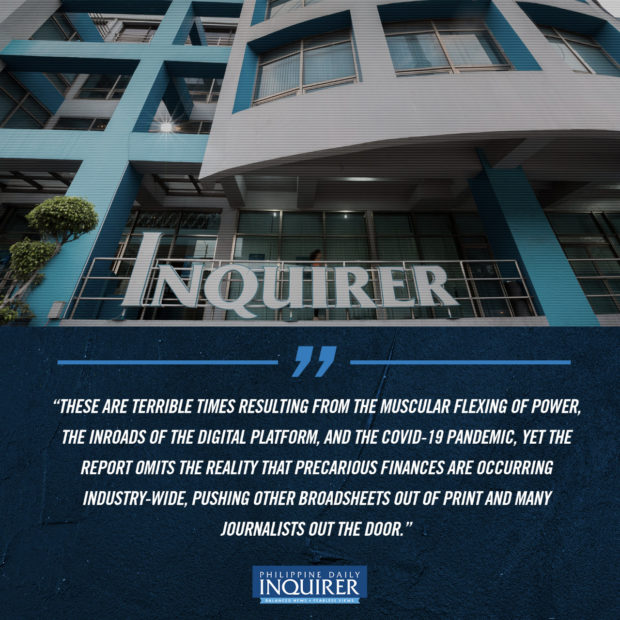
In what’s called the traditional media, news organizations reporting on each other was once a rarity and often limited to, say, the death of a journalist distinguished in the field. Time was when the mention of a newspaper’s name by another or of a network by another was quaintly seen as boosting the competition and giving it a leg up, and therefore a no-no.
These days, however, it’s par for the course for news organizations to report on other such entities, so that those who present the news are now the news. The seething political landscape under the Duterte administration, where speaking truth to power is now the media‘s most crucial and dangerous task, has made it possible. The killing of the ABS-CBN franchise, the cyberlibel conviction of the Rappler editor in chief, the murder of news correspondents, and other startling developments in the Philippine media have necessitated coverage of those who do the covering.
But Rappler’s recent report on the “painful cuts” lately taken by the Philippine Daily Inquirer, including the volunteer retirement program offered to its employees, is an unsettling read because it portrays the nation’s biggest newspaper on its knees. (On the other hand, it pleases those who find satisfaction in the misfortune of others.) This newspaper carries a rich history of grit and resistance; that it is navigating a precarious financial time that threatens its very survival should be disturbing news to those who acknowledge its place in the national sphere as well as its efforts in preserving the democratic space, and who wish for it the stamina to hang on.
The report is quite detailed and includes the date of the management memo on voluntary retirement, and even the number of employees who sought and were granted inclusion in the program, suggesting that the reporter ferreted out the information with a master mechanic’s skill. But the very details of the newspaper’s cost-cutting measures indicate the source(s)’ strange eagerness to tell all—rather depressing for the weary observer committed to the idea that divulging confidential matters in one’s home or office is indelicate, inelegant, and ultimately mean-spirited.
To be sure, emotion shouldn’t get in the way of cold coverage. But the participants in the two-way process of coverage should have been given pause. The developments at the Inquirer are, after all, nowhere near the dimensions of, say, the plunder of funds intended for public health care. In fact, the steps taken were meant to ensure that the Inquirer would endure. Bonuses and benefits expected by its regular employees have been received by them. No one was put to pasture kicking and screaming and clutching at the steps of the winding stairs—although the exit of certain employees and columnists will doubtless allow the sad erosion of institutional memory.
These are terrible times resulting from the muscular flexing of power, the inroads of the digital platform, and the COVID-19 pandemic, yet the report omits the reality that precarious finances are occurring industry-wide, pushing other broadsheets out of print and many journalists out the door. The absence of context is so patent that the reader ignorant of the realities of newspapering, primarily the huge production costs now exacerbated by plunging advertising revenues, will be moved to tsk-tsk over how the mighty have fallen.
The Inquirer is trying to keep its head above today’s turbulent waters and its people are as stressed and put upon as other Filipinos by the effects of the longest lockdown and the administration’s less than masterful handling of the public health crisis, among others. It’s easy to see that they don’t appreciate reportage which presents their travails separate from those plaguing the whole industry and which merely makes a case for gossip. The last thing they need is to be forced to parry expressions of sympathy (as though they’re trembling on the brink of extinction) and intrusive interest (as though they had become curiosities) on top of the continuing exigencies of work and family life. But no one’s throwing in the towel just yet. The reporter Marinel Cruz said it well when she said the women and men of the Inquirer are holding up and fighting: “Hindi po kami lugmok sa kalungkutan…”
Once upon a time during the Estrada administration, they were exactly that, too. The ad boycott was taking a dramatic toll on the newspaper’s financial state, but not enough to dissipate the management and employees’ determination to survive. No social media yet then, but those who have stayed long enough will remember that every inch of space on the giant bulletin board in the newsroom was covered by ardent messages of public support.
—————
chatogarcellano@gmail.com

